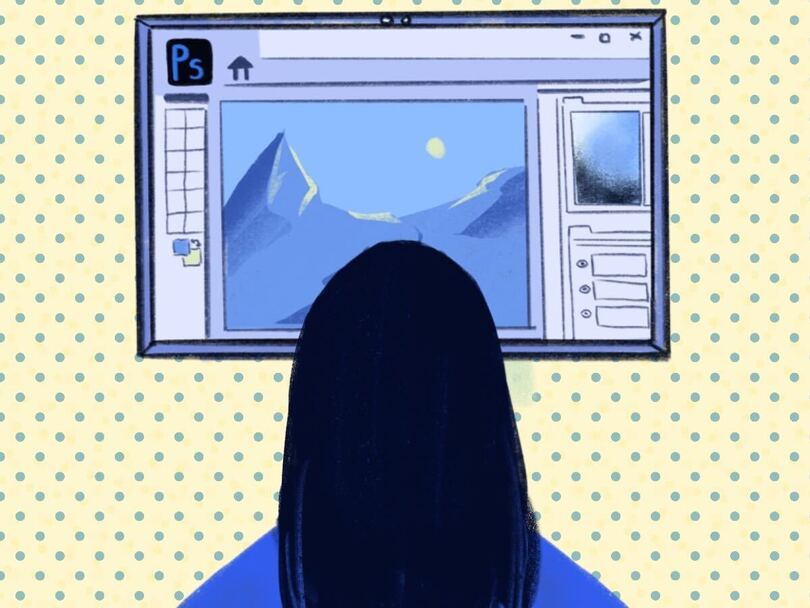School of Art students grapple with limited access to Adobe Creative Cloud

As students call for Adobe Creative Cloud access on their personal devices, administrators are evaluating the platform's necessity. On Friday, School of Art faculty will meet to discuss Adobe softwares' place in curriculum. Flynn Ledoux | Illustration Editor
Get the latest Syracuse news delivered right to your inbox.
Subscribe to our newsletter here.
Dusty Herbig was preparing for an optional five-week course on Photoshop when he encountered a problem: none of his students could access Adobe Creative Cloud services on their personal devices.
Herbig, who’s the coordinator of the Print Media & Graphic Art area of Syracuse University’s School of Art, didn’t find this out until the first day of classes. He searched for roughly two weeks to find a computer lab in the Shaffer Art Building where he could hold class.
“That was when rubber really hit the road for me,” Herbig said. “It’s only a five-week class, and it took us two or three weeks to find a lab that people could go to, and it had to be special permission at a lab down in Film and Media Arts in Shaffer.”
Many students in SU’s School of Art don’t have access to Adobe CC on their personal devices through their academic program. Students in SOA, which is housed in SU’s College of Visual and Performing Arts, have lobbied for access over the past year, but said school administrators haven’t adequately addressed their concerns or communicated effectively.
Robert Wysocki, SOA’s director, said his goal is to get Adobe CC personal device licenses for all sophomores, juniors and seniors in the school by August 2025. But that depends heavily on faculty input as well as SOA curricular changes, he said.
“It’s just a matter of purchasing what we’re going to use, and not just throw money into software that most of them aren’t going to use,” Wysocki said. “We have to bake it into the curriculum, so it’s hand in hand with what we’re doing in studios.”
At SU, the School of Architecture, S.I. Newhouse School of Public Communications, and VPA’s ’ School of Design, Department of Film and Media Arts and Department of Drama grant access to Adobe CC personal device licenses. Other institutions such as Boston University, Colgate University, and Northwestern University grant access university-wide.
Students can log into their SU accounts and access Adobe CC services on SU’s campus computers.
Lily Ryan, a senior studio arts major, said that during their freshman year, there were six computers at the Comstock Art facility, where most studio arts classes are held. Now, there are only four in the entire building, Herbig said. Two of those are maintained effectively, Ryan said.
Studio arts classes tend to have roughly 10 students, so there can be as many as 100 students using the building at any given time, Herbig said. With only two fully functional computers, he said teaching courses that require Photoshop or Illustrator is challenging.
“It’s like not being able to show up with pencils to an art class,” Herbig said.
Herbig conducted his own research on how Adobe CC access is distributed among schools. On Facebook, he sent a poll to a network of printmaking professors and asked if their programs provided Adobe CC. The poll had four options: “yes,” “yes but only if enrolled in a class,” “yes but only on university computers,” and “no.”
Of the almost 100 responses he received, only two professors said “no.” Herbig said SOA would technically fall under the “yes but only on university computers” variation, but SU “doesn’t make it accessible.”
“It’s there, but the computers aren’t,” Herbig said. “It’s like, ‘Yeah, I’ll give you a free gas card, but you don’t have a car.’”
Adobe CC charges university students $20 per month for the first year of personal device licenses, but $35 per month for all remaining years.
Shouldering the personal license cost in addition to art supplies and tuition can be prohibitive to students, Zoe Requena, a studio arts senior and international student, said. When choosing schools, SOA stood out to her since she heard supplies were provided through the program.
But once she arrived on campus, Requena discovered this wasn’t the reality. She said she has to pay almost $300 a semester for her own supplies, on top of tuition costs.
“It really, really angers me, because I went to other schools where a lot of things would have been cheaper for me,” Requena said. “But now I don’t even have Adobe.”

Collin Snyder| Staff Photographer
Wysocki, hopes to offer Adobe CC personal device licenses for SOA sophomores, juniors and seniors by August 2025. He said its approval will require unified support from faculty.
Belle Halt, a sophomore studio art major, said internships in her career field require or strongly recommend a basic understanding of Adobe CC. Even though Halt is minoring in design studies in VPA’s School of Design, she still doesn’t have access to the software.
The classes for design typically require or recommend Adobe CC softwares for part of the course load, Halt said, so access is essential to her academics. Along with Abigail Shim, a sophomore studio arts major, Halt turned to René Vetter, a junior illustration major, for advice on how to advocate for Adobe CC access.
On Sept. 12, Vetter emailed a letter with a list of complaints from 27 other junior illustration majors to Wysocki and other faculty at SOA. Among their complaints was the lack of access to Adobe CC.
A few weeks later, Vetter said Adobe CC was only made available for junior and senior illustration majors. Studio arts majors, along with illustration sophomores and first-years, still don’t have access.
Wysocki said he was more open to getting illustration students access to Adobe CC than studio arts students, as the costs associated with the illustration major are lower. “Consumables,” like saw blades, sandpaper and work gloves, in the studio arts curriculum demand “quite a bit of money” from SOA, he said.
When the junior illustration majors returned to campus for this spring semester, Vetter said they initially didn’t have access to Adobe CC, despite their petition in the fall. After the students reached out to Wysocki multiple times, Vetter said Adobe CC access was restored on students’ personal devices.
The lapse in access was because the license Wysocki had procured for the students expired over break, which surprised Wysocki.
Halt and Shim said they began contacting Wysocki at the beginning of the spring semester about Adobe CC access for studio arts majors, but didn’t receive a response. They then began emailing other faculty members.
They also sent out a survey to fellow SOA students, receiving 97 responses.

Cole Ross | Digital Design Director
Wysocki said the question among faculty of implementing Adobe CC into the curriculum has always been whether students will actually use it.
On Feb. 19, Halt and Shim met with Sam Van Aken, SOA’s associate director, about Adobe CC access and showed him the data they gathered.
Van Aken was sympathetic to their complaints, and agreed that personal device licenses would be preferable to increasing lab space at the Comstock Art facility — and likely cheaper.
“(A lab) is a big monetary investment, and what’s the sense in building a lab if students don’t really want to go to the lab anyway?” Van Aken said.
Halt and Shim said Van Aken suggested remote digital desktop as a solution, which allows students to treat their personal devices like an SU computer, complete with Adobe CC. But students said that solution is inadequate.
Ryan said when they used the remote desktop, they couldn’t transfer files off their computer. When Halt used InDesign through the remote desktop, it frequently crashed, she said.
The department is also facing a fundamental debate in how to organize their curriculum, Wysocki and Van Aken said. The debate between teaching digital and physical techniques is something SOA has been dealing with since the COVID-19 pandemic, Van Aken said.
“First-year students are coming in much more adept on their phone than they are with the pencil,” Van Aken said. “Should we be taking them in a different direction, or meeting them where they’re at and building from that skill set?”
In his work as a sculptor, Van Aken said he uses Adobe CC “weekly, if not daily.” He said first-year students should be learning Adobe CC, but that this debate needs to be resolved at the faculty level.
“When people have a need, they expect it to be addressed immediately, but universities tend to work a little more slowly than that,” Van Aken said. “That’s a good and a bad thing, but it makes sure that the decisions are thorough and takes people into account.”
He said he likes to think the department is responsive to student complaints, but as faculty evaluate the curriculum, students may see the process as delayed. Van Aken said he’s been collecting feedback from students and faculty to figure out if Adobe CC access needs to be required across SOA.
“The first decision that needs to be made is by the faculty,” Van Aken said. “At that point, we can look at how we go about paying for it.”
Herbig said the issue should be resolved at the college level; Adobe CC should be provided to all students in VPA, with the costs taken out of VPA’s budget, he said.
Van Aken told Halt and Shim that if SOA provided personal device licenses to each student, it would likely mean an increase in student fees. He said it would be in all parties’ economic interest for students to purchase private licenses individually, like textbook fees.
Halt and Shim planned to attend a faculty meeting set for March 7, where Van Aken and Wysocki said they would discuss access, but the meeting was abruptly canceled and rescheduled.
Herbig said the rescheduling was partially due to a scheduling conflict with SOA’s MFA opening show in New York City. But Herbig said abrupt meeting cancellations are common, and issues aren’t always circled back to in future meetings.
Van Aken and Wysocki said there will be a faculty meeting on Friday, partially to speak about curricular changes, including the Adobe issue. Wysocki said it’s one of many items on the agenda.
Herbig said he’s brought up the issue of Adobe CC access in several faculty meetings in the past, but administrators haven’t given it “one iota” of attention.
“People always talk about it, but there never seems to be any movement or change,” Herbig said.
DISCLAIMER: René Vetter is a contributing cartoonist for The Daily Orange. He was not involved in the editorial process of this article.





